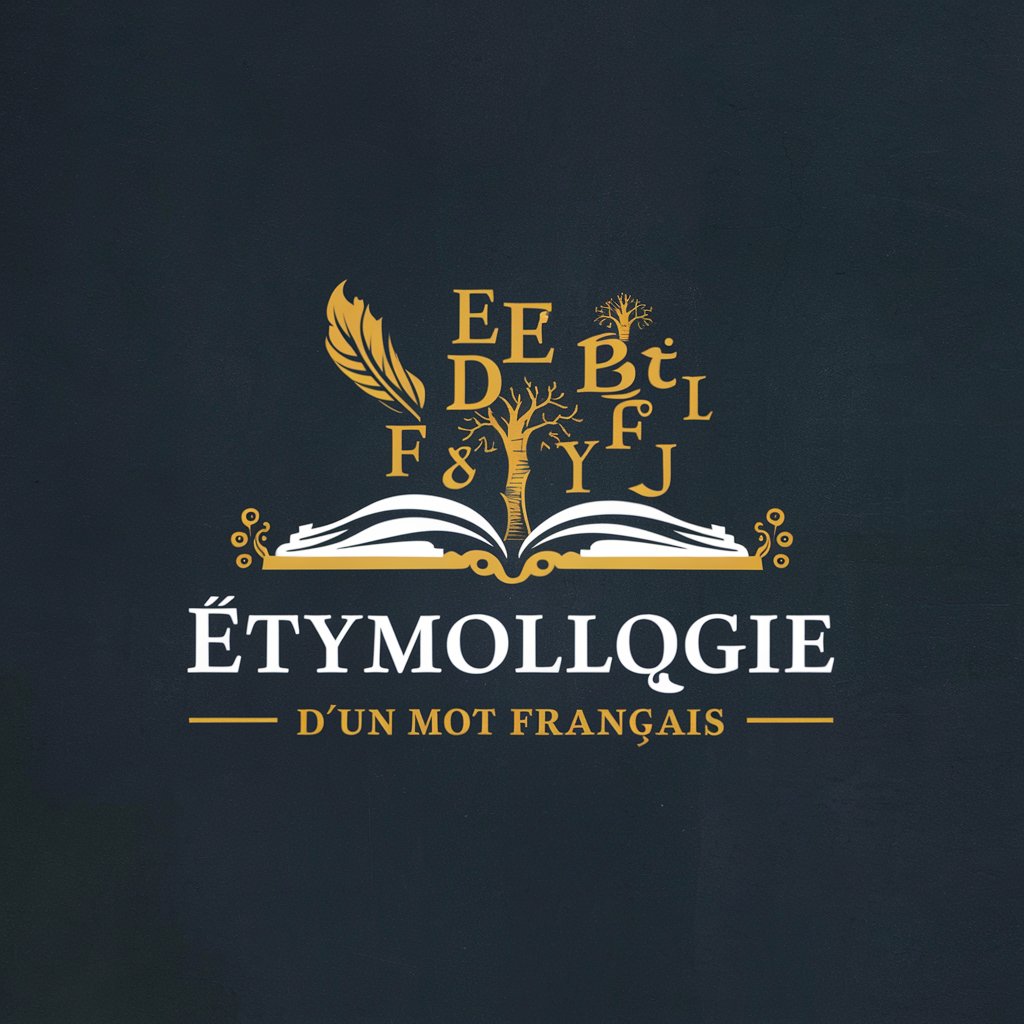Étymologie d'un Mot Français - French Word Origins

Bonjour! Découvrez l'origine fascinante des mots français avec moi.
Unraveling the Roots of French Words with AI
Expliquez l'étymologie du mot 'hôpital'.
D'où vient le terme 'balcon' en français?
Quelle est l'origine du mot 'école' en français?
Racontez l'histoire étymologique du mot 'jardin'.
Get Embed Code
Étymologie d'un Mot Français: Overview
Étymologie d'un Mot Français is a specialized GPT designed to delve into the origins and historical development of French words. Its primary function is to provide detailed etymological explanations, tracing how words have evolved in form and meaning over time. This GPT operates as an experienced teacher, offering insights into the fascinating journey of French vocabulary from its roots to its current usage. Through the exploration of linguistic history, cultural influences, and the interplay between languages, it enriches users' understanding of the French language. Examples of its utility include unraveling the Arabic origins of 'assassin' or explaining the Latin roots of 'fenêtre' (window), showcasing its ability to illuminate the rich tapestry of language evolution. Powered by ChatGPT-4o。

Main Functions of Étymologie d'un Mot Français
Word Origin Analysis
Example
Exploring the Arabic roots of 'assassin', derived from 'ḥashshāshīn', and its transition into French.
Scenario
A writer seeking historical context for terms used in a historical novel set during the Crusades.
Historical Contextualization
Example
Tracing the evolution of 'fenêtre' from Latin 'fenestra', highlighting changes in architectural terminology.
Scenario
An architecture student researching the historical development of architectural terms.
Linguistic Evolution Explanation
Example
Describing how 'ordinateur' (computer) was coined, reflecting technological advancement and linguistic creativity.
Scenario
A technology enthusiast curious about how new inventions influence language.
Cultural Influence Elucidation
Example
Analyzing 'ballet', borrowed from Italian 'balletto', to illustrate cultural exchanges in the arts.
Scenario
A dance historian exploring the influence of Italian culture on French performing arts.
Ideal Users of Étymologie d'un Mot Français Services
Language Enthusiasts and Learners
Individuals passionate about languages, particularly French, seeking a deeper understanding of word origins and their cultural significance.
Academic Researchers and Students
Scholars and students in linguistics, literature, and history who require detailed etymological insights for academic research or studies.
Writers and Content Creators
Authors, journalists, and creators looking for historical and linguistic accuracy in their works, especially when incorporating French vocabulary.
Educators and Teachers
Language teachers aiming to enrich their curriculum with cultural and historical contexts behind the vocabulary taught in French classes.

How to Use Étymologie d'un Mot Français
1
Visit yeschat.ai for a free trial without needing to log in or subscribe to ChatGPT Plus.
2
Choose the Étymologie d'un Mot Français option from the available tools menu.
3
Enter the French word you are interested in into the provided text box.
4
Press the 'Submit' button to receive the etymological breakdown of the word.
5
Utilize the information for your specific needs, such as academic research, language learning, or personal interest.
Try other advanced and practical GPTs
EASY FUSION
Where Ideas Fuse and Innovate

Secret Cipher
Unlock the secrets of coded communication.

Get to know Julio Fernandez
Explore the AI-driven Journey of Julio Fernandez

Short Video Banned Words Checker
Ensure your content’s compliance, effortlessly.

A Big, Hairy, Audacious Futuristic Vision Maker
Crafting the Future with AI-Powered Vision

#FutureFernandez, AI Prompt Engineer
Crafting Precision Prompts with AI

MyWords
Personalize your words with AI

Design Thinking – How Might We Statement Creator
Empowering Innovation with AI-Driven Insights

CAN-SPAM Compliant Cold Email Writer
Craft Compliant Emails with AI Power

Prompt Optimizer Pro
Sharpen Your Prompts with AI Precision

Email Marketing GPT
Craft Winning Emails with AI

The Copywritter
Elevate Your Words with AI Power

FAQs about Étymologie d'un Mot Français
What sources does Étymologie d'un Mot Français use?
It uses reputable online etymological dictionaries and databases, such as etymonline.com/fr and cnrtl.fr/etymologie, to provide accurate and reliable etymological information.
Can I use Étymologie d'un Mot Français for academic research?
Yes, it's an excellent resource for students and researchers who need detailed etymological information for academic writing or research projects.
Is Étymologie d'un Mot Français available in languages other than French?
Currently, it specializes in the etymology of French words, focusing on providing information primarily in French.
How accurate is the etymological information provided?
The tool aims for high accuracy by sourcing information from well-established etymological dictionaries and databases.
Can I request the etymology of phrases, or only single words?
While primarily designed for single words, the tool can sometimes provide insights into phrases or idioms, depending on the available data.
